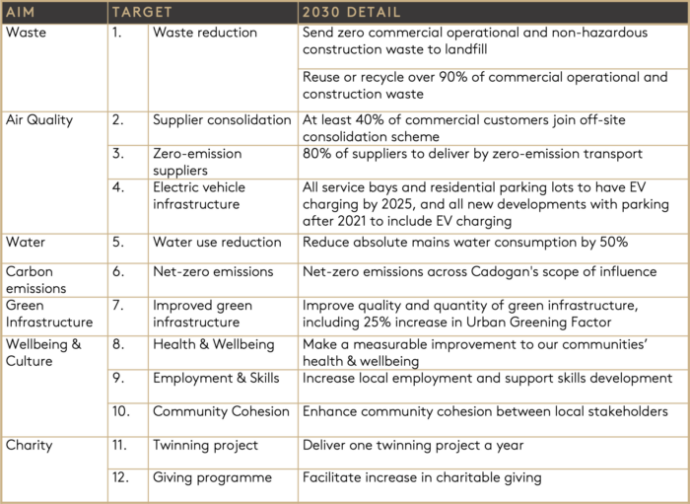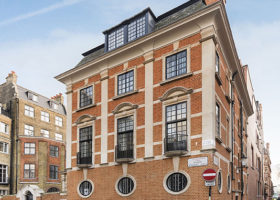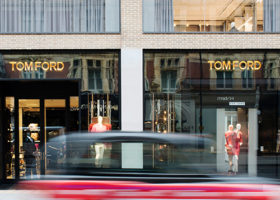Chelsea 2030 – Cadogan launches ambitious pledge to become net-zero within the next 10 years
Chelsea 2030 sets out 12 ambitious targets contributing to a more sustainable city. Cadogan’s ten-year plan is to drive a positive and sustainable future across the 90 acre estate in Chelsea, including a roadmap to become net-zero.
Chelsea 2030 Strategy | Net Zero Pathway – see latest update here
The Chelsea 2030 Stewardship Strategy outlines 12 new targets supported by a multitude of initiatives that will reduce Cadogan’s own impact on the environment and that of its occupiers and suppliers, while also protecting Chelsea’s unique heritage and supporting its community. This follows extensive local consultation to understand the most pressing concerns facing local residents and businesses – and create a clear roadmap for Cadogan to help accelerate positive change, with a focus on tackling urgent global crises such as climate change and more local issues including air quality.
Hugh Seaborn, Chief Executive, Cadogan said “We take pride in the active role we play in shaping this remarkable neighbourhood. Although work on the Chelsea 2030 strategy began over two years ago now with an extensive community consultation, I feel it could not be launching at a more important time to ensure that we are contributing to a more sustainable future. It has never been more obvious that we must work together to build the city – and the quality of life – that we want for ourselves and our children.”
Chelsea 2030 aims to reduce environmental impacts through clear targets on waste management, water use, green infrastructure and emissions. The built environment is responsible for 40% of the UK’s carbon emissions each year, with a pressing need for the real estate industry to work together to cut waste, source sustainable materials and reduce emissions through supply chain management. As part of the commitment to becoming a net zero emission Estate by 2030, Cadogan has signed the Better Building Partnership Climate Change Commitment to publish their Net Zero Pathway to achieving this.
Chelsea 2030 also focuses on improving wellbeing and health, maximising employment and skills opportunities, and creating better community cohesion. While Cadogan currently supports nearly 15,000 jobs in RBKC directly, it aims to provide further support to employment and increase the skillset of disadvantaged parts of the community, especially vital following the pandemic’s job losses and economic hardship. By working in partnership with the Royal Borough of Kensington & Chelsea, Cadogan can deliver tangible employment outcomes such as recruiting an Employment Opportunities Coordinator to help unemployed local people work in local businesses, alongside other community targets.
Kate Neale, Sustainability Manager, Cadogan comments “Chelsea 2030 strengthens Cadogan’s objectives to bring sustainability to the fore and contribute further to improving local quality of life. Our long-term commitment comes with a responsibility to ensure a positive contribution to Chelsea’s next chapter. This strategy provides a foundation we will continually build on and we look forward to reporting annually on progress to ensure greatest benefit to the local community over the coming decade and beyond.”
Simon Birkett, local resident and Founder and Director of Clean Air in London adds “Cadogan has a major financial, social and environmental stake in Chelsea and clearly cares deeply about these issues over generations. I am greatly impressed by their carefully considered long-term plan for this historic part of London. Focusing on science-based goals and the needs of the community is key to achieving a healthier, inclusive and more sustainable city.”
Sarah Ratcliffe, CEO, Better Buildings Partnership concludes, “We are delighted that Cadogan has become a signatory to the BBP’s Climate Commitment. It is clear from the carbon footprint assessment that embodied energy and occupier emissions are critical issues and it is good to see Cadogan setting clear targets and emphasising the importance of a collaborative approach. With its buildings predominantly located in Chelsea, this commitment will see Cadogan pursuing the ambition of a net zero emissions estate in an area with significant heritage and conservation value and we look forward to sharing the learnings gained from this unique portfolio.”
Chelsea 2030 Aims and Targets:





